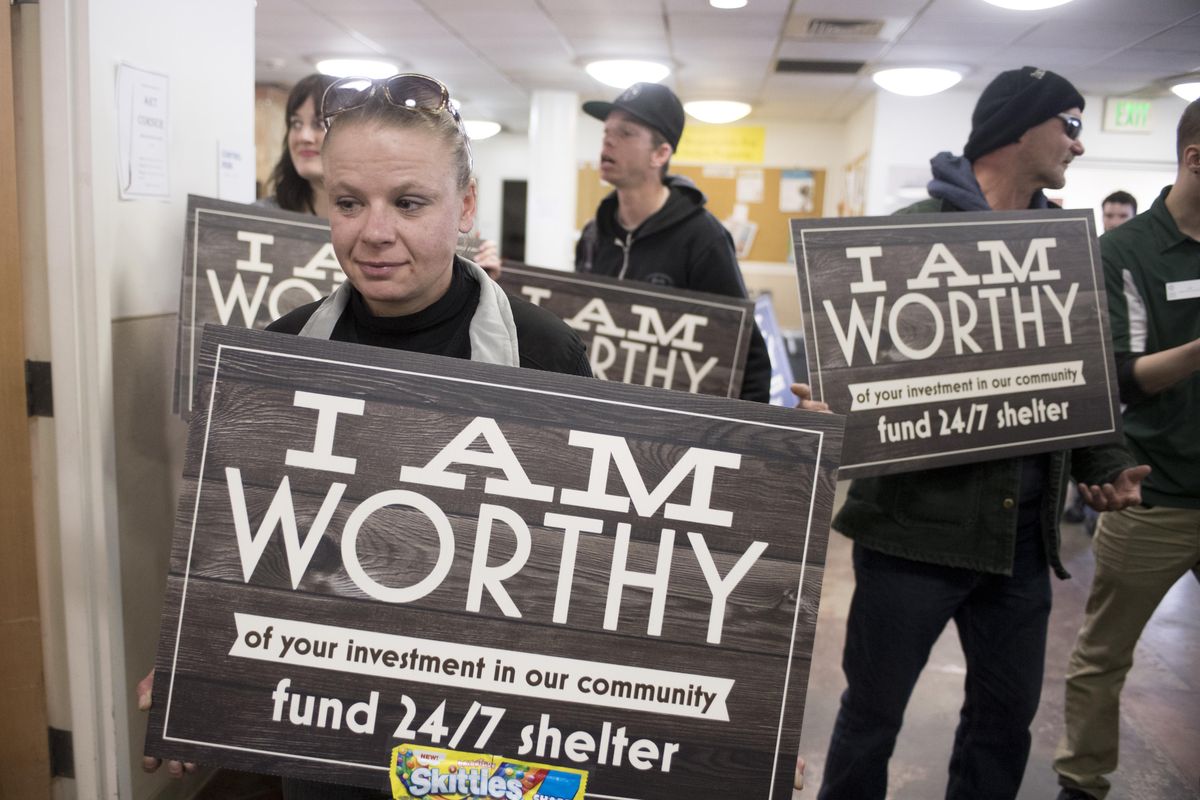Downtown Spokane Partnership joins call for keeping extended homeless shelter hours

For Joe Newton, the best thing about having a homeless shelter open all day, every day, is not worrying about being arrested.
Newton, 59, has been homeless in Spokane about four years. He worked as a trucker in Alabama and came to Spokane because he had children here.
When his commercial driver’s license expired, he couldn’t afford to get certified in Washington or return to Alabama, so he lost his job. Now he finds no one wants to hire someone who’s a few months shy of 60.
“I’d be glad to go work if somebody would hire me,” he said.
Since Spokane declared it would create a 24/7 homeless shelter system for single men, single women and families, Newton has spent nights on the floor at the shelter, rather than outside.
Being inside keeps him from getting in trouble with police for breaking one of the city’s laws against trespassing, camping, sitting or lying on a downtown sidewalk.
“We don’t have to worry about going to jail for trespassing,” he said.
Newton was among the people listening to a news conference Thursday at House of Charity. Mark Richard, president of the Downtown Spokane Partnership, joined Catholic Charities CEO Rob McCann to push the community to step up and help the shelter fund extended hours.
McCann announced earlier this week House of Charity will have to close during the day and end its expanded overnight space for men and women starting May 1. The shelter will remain open at night for 109 men in upstairs beds, as it has done for years, and have limited daytime hours to serve lunch.
Those regular hours cost Catholic Charities about $1 million a year and are funded chiefly by private donations.
The shelter took on an expanded role in November after the city announced it was funding a 24/7 shelter system. That meant opening a day shelter for families with kids through Family Promise, and expanding funding for House of Charity to house adult men and women and the Salvation Army, which housed families overnight.
Aside from a few small shelters for domestic violence victims, there are no homeless shelters in Spokane Valley.
The only problem? The cost of those expanded shelters was $1.5 million a year.
When the city announced the plan, they intended to contribute $750,000 toward that cost and raise the rest of the money from other sources, including Spokane County, Spokane Valley and private businesses. That didn’t happen, they told Catholic Charities in February.
McCann had previously told Spokane County that House of Charity wouldn’t need county money in 2017. He said he didn’t apply for discretionary funding from Spokane Valley because the entire city budget for funding outside organizations is $200,000, which is split between a number of existing local nonprofits that rely on that money.
With the county and Spokane Valley looking reluctant to find funding now, he’s hoping instead to lobby for a 2018 line item in all three government agencies’ budgets, permanently.
“It shouldn’t be something we have to fight for every year,” he said.
Richard, from the Downtown Spokane Partnership, stood side-by-side with McCann and spoke in support of the shelter’s expanded hours, saying the business community needs to do more.
“These are our families, these are our neighbors and our friends who have fallen on hard times,” he said.
The partnership gave the shelter $25,000 last year and promised another $25,000 to match donations from businesses. Local businesses gave $10,000, Richards said, but $15,000 in unclaimed matching money is still available if others step up.
Downtown businesses have seen the positive impact of the shelter’s expansion, Richard said. The ambassadors who work for the partnership have gotten fewer calls about homeless people sleeping in front of their stores or being disruptive since they have a place to go.
The Spokane Fire Department also has seen a positive impact, medical services manager Mike Lopez said. They’ve received more medical calls at the House of Charity, but fewer in other parts of downtown. On the whole, there hasn’t been an increase.
That means it’s easier to follow up with people who are “super-users” of emergency services and get them the care they need so they aren’t going to the hospital a few times a week.
“It’s easier for us to link with the individuals to provide the resources they need,” he said.
To help private citizens make donations, the downtown partnership helped Catholic Charities set up a text donation feature. People can make a $5 donation to House of Charity by texting “CHANGE” to 50555.
“Step up and help us solve this problem,” Richard said.
In a news release Thursday, Mayor David Condon said the city would seek applications for a daytime shelter for adults in 2018 to close the gap in the system. That could be House of Charity, another provider or combinations.
City funding for the Open Doors family shelter run by Family Promise would run through the end of the year, said Brian Coddington, the mayor’s spokesman.
McCann said he welcomed other organizations to give input or step up, and that Catholic Charities would help train anyone interested in running a shelter.
His focus now is on getting that permanent funding for 2018 so homeless people have a place to go year-round.
“Contact your elected officials and tell them this is important to you,” he said. “We’ll figure out a way to survive this year.”